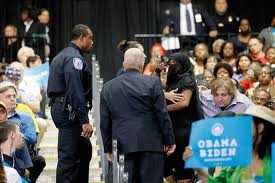
Richmond, (Va). May 9: A woman dressed in a black burka was removed during President Obama's inaugural re-election campaign stop at Virginia Commonwealth University last Saturday.
According to a White House pool report, photographers observed the woman being escorted out of the gym by Richmond police and other security officials. The woman appeared to be wearing dark clothing and U.S. military pins and was carrying a book. She cooperated with police, according to the report.
CBSDC obtained video of the incident from VCU journalism instructor Vivian Medina-Messner. In the video, you can hear the woman shouting while being escorted out of the building by police.
VCU Police Chief John Venuti told CBS 6 WTVR that the Secret Service is now investigating the incident.
On Saturday, the president opened his bid for a second term in two states critical to victory in November. He flew to Richmond from a similar rally in Columbus, Ohio, on the Ohio State University campus.
Like Ohio, the Richmond crowd was largely a young one, college and high school students and Boy Scouts. It was the same demographic that formed the core of Obama's well-organized army of volunteers that delivered Virginia for him four years ago.
Playing to that, one of the president's marquee warm-up acts was Shaka Smart, the popular coach who led Virginia Commonwealth University's upstart basketball team to an NCAA Final Four berth in 2011. And in VCU's Siegel Center, the low-ceilinged arena where Smart's team plays, the ovation when the president appeared reached ear-splitting levels, at times forcing Obama to noticeably strain his already hoarse voice to be heard.
“Four more years! Four more years,” the crowd screamed. Other times, it chanted, “Fired Up! Ready to go!”
In what his campaign is defining as a “make-or-break moment for the middle class,” Obama drew cheers when he tore into presumptive Republican nominee Mitt Romney. He called Romney a “rubber stamp” for Republicans in Congress intent on cutting taxes on the wealthy while bleeding programs for the middle class and freeing corporations and Wall Street of from reforms enacted after the 2008 economic collapse.
“Corporations are not people, people are people,” Obama said, mocking Romney's comment last fall to a state fair crowd in Iowa.
“He sincerely believes that when CEOs and wealthy investors like him make money, the rest of us automatically prosper as well,” Obama said. “Bigger profits do not lead to bigger jobs. You've never worked harder in your lives.”





Comments
Add new comment